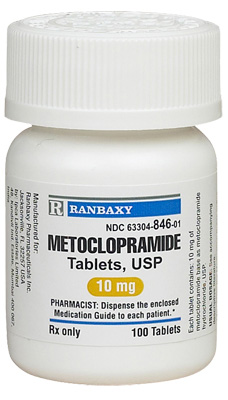Metoclopramide Overview
Metoclopramide is a prescription medication belonging to a class of drugs known as dopamine-2 antagonist antiemetics and gastroprokinetic agents. It is primarily used to treat certain conditions of the stomach and intestines. Metoclopramide works by increasing the movements or contractions of the stomach and intestines, as well as by blocking dopamine receptors in the chemoreceptor trigger zone of the central nervous system to prevent nausea and vomiting.
Indications and Usage
Metoclopramide is indicated for the relief of symptoms associated with acute and recurrent diabetic gastroparesis, the prevention of nausea and vomiting associated with emetogenic cancer chemotherapy, and the prevention of postoperative nausea and vomiting (PONV) when nasogastric suction is considered inappropriate. It is also used off-label for conditions such as gastroesophageal reflux disease (GERD), and as an adjunct to facilitate small bowel intubation and radiological examination of the upper GI tract.
Dosage Forms and Strengths
Metoclopramide is available in several dosage forms and strengths. Oral formulations include tablets typically available in 5 mg and 10 mg strengths, and an oral solution that is usually a 5 mg/5 mL concentration. Injectable forms come in single-dose vials with a usual concentration of 5 mg/mL, and also as a pre-mixed injection for intravenous (IV) use.
Dosing Information
For gastroparesis, the usual adult dose is 10 mg taken orally, 30 minutes before each meal and at bedtime for 2-8 weeks. For the prevention of chemotherapy-induced nausea and vomiting (CINV), doses vary based on the chemotherapy regimen. The recommended IV dose is usually 1-2 mg/kg, given 30 minutes before administration of a high emetogenic chemotherapy drug, followed by subsequent doses. For PONV, the suggested dose range is 10-20 mg administered IV, given near the end of surgery. Doses for children are calculated based on body weight, and adjustments are usually needed for patients with renal impairment.
Administration Instructions
Metoclopramide tablets should be taken on an empty stomach, at least 30 minutes before eating and at bedtime, as per the prescribing information. The solution form should be measured with an accurate measuring device. For IV or intramuscular (IM) administration, proper technique should be followed to ensure the suitability of the solution prior to use. For IV use, metoclopramide injection can be either injected directly or mixed with common IV solutions and infused over a period as recommended by the prescribing healthcare provider.
Pharmacological Mechanism
Metoclopramide functions as a dopamine receptor antagonist leading to increased lower esophageal sphincter tone, enhanced motility of the upper gastrointestinal tract without increasing the production of secretions, and increased coordination of the gastric emptying process. It also acts centrally in the chemoreceptor trigger zone (CTZ) by blocking dopamine receptors, thereby exerting its antiemetic effect.
Pharmacokinetics
Following oral or IV administration, metoclopramide is rapidly absorbed with peak plasma concentrations occurring at about 1-2 hours post-dose. It demonstrates a moderate bioavailability due to first-pass metabolism. The drug is widely distributed in body tissues, crosses the blood-brain barrier, and is also found in breast milk. Elimination half-life is generally 5-6 hours and it is predominantly excreted in urine, with approximately 85% eliminated in the urine in unchanged or conjugated form. Renal impairment significantly affects the elimination rate of the drug.
Drug Interactions
Metoclopramide may interact with other medications. Concomitant use with central nervous system (CNS) depressants may enhance sedation. It can potentiate the effects of antihypertensive agents and may affect the absorption of drugs where gastric emptying rate is an important determinant of bioavailability. Metoclopramide may also decrease the efficacy of drugs that require a high gastric pH for absorption. Concomitant use with monoamine oxidase inhibitors (MAOIs) can result in hypertensive crises, thus caution is advised.
Adverse Reactions
Common adverse reactions to metoclopramide include drowsiness, fatigue, and restlessness. Extrapyramidal symptoms such as acute dystonic reactions, parkinsonian-like symptoms, and tardive dyskinesia may also occur, particularly in young adults and with prolonged use. Less common side effects include hyperprolactinemia, resulting in galactorrhea, gynecomastia, or menstrual irregularities. Gastrointestinal disturbances, hypotension, and hypertension have been reported. Serious but rare reactions include neuroleptic malignant syndrome (NMS) and cardiac conduction abnormalities.
Special Populations
In special populations such as the elderly, individuals with renal or hepatic impairment, and pediatrics, dose adjustment and careful monitoring may be necessary. Metoclopramide is not recommended for use in children for FDA-approved indications except in specific clinical circumstances. In patients with renal or hepatic impairment, the elimination half-life of metoclopramide may be increased, necessitating dose adjustments and monitoring for potential toxicities.
Overdosage
In cases of metoclopramide overdose, symptoms can include drowsiness, confusion, and extrapyramidal reactions. Treatment should be supportive and symptomatic, with close clinical monitoring. If the overdose is recognized promptly, gastric lavage may be helpful in preventing further absorption. Dialysis is not likely to be effective due to the high volume of distribution of metoclopramide. There is no specific antidote for metoclopramide overdose.
Storage and Handling
Metoclopramide should be stored at room temperature, away from light and moisture. Injectable forms should not be frozen and should be protected from light. Depending on the manufacturer’s instructions, some injectable forms of metoclopramide may require refrigeration before use. All forms should be kept out of reach of children and pets, and dispensed in original containers unless repackaged by a pharmacist.
Patient Counseling Information
Patients should be counseled on the risk of drowsiness with metoclopramide and advised not to drive or operate machinery until they understand how the medication affects them. They should be instructed to report any extrapyramidal symptoms or signs of tardive dyskinesia immediately. Patients should also be informed of the potential for symptoms to persist after discontinuation of the therapy, and should be educated on the proper dosing schedule and administration techniques for their prescribed form of metoclopramide.







Reviews
There are no reviews yet.